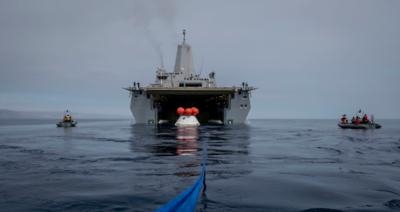Wed, Aug 06, 2014
Preparations Continue For December Test Flight
A test version of NASA's Orion spacecraft was floated inside the well deck of the U.S.S. Anchorage on Aug. 2, 2014, during recovery tests off the coast of California. A combined NASA and U.S. Navy team practiced recovery techniques over the weekend, in preparation for Orion's first trip to (and return from) space in Exploration Flight Test-1 (EFT-1) in December.

During that first underway recovery test in February, dynamic conditions caused activities to conclude before all of the test objectives were met. Since then, the team has been working on concepts that would allow them to safely recover Orion despite such conditions.
"During this test, the team will investigate alternative procedures and recovery methods," said Mike Generale, Orion Recovery Operations manager and Recovery Test director at NASA's Kennedy Space Center in Florida prior to the operation. "One of the goals of the test is to have a primary and alternate means of recovering the Orion crew module for Exploration Flight Test-1 later this year."
The Orion test vehicle was loaded into the well deck of the USS Anchorage (LPD 23), and the team headed out to sea off the coast of San Diego in search of sea conditions to support test needs. New support equipment developed for URT 2 accompanied the test vehicle.
New hardware includes an air bag system for the Crew Module Recovery Cradle and a load-distributing collar for placement around the crew module. The Prototype Laboratory at Kennedy designed a new device called the Line Load Attenuation Mechanical Assembly (LLAMA) that limits the tending-line forces for the Navy line handlers as Orion is guided into the ship's well deck.
Tending line snubbers, a kind of commercially available rubber shock absorbers sailors use for tending lines, also were tested. "Each of the new pieces of hardware will be evaluated for its relative merits, and the best solutions will be tested during URT 3 in September to discover the limits of their capabilities and suitability for Orion's Exploration Flight Test-1 in December," Generale said.
All of this testing ensures NASA can retrieve the Orion capsule safely because it helps the team understand how to adjust for various water conditions and contingency scenarios.
(Image provided by NASA)
More News
Airport Marking Aids Markings used on runway and taxiway surfaces to identify a specific runway, a runway threshold, a centerline, a hold line, etc. A runway should be marked in ac>[...]
"It is extremely difficult, if not impossible, for manned aircraft to see a drone while conducting crop-enhancing and other aerial applications at low altitudes and high speeds. We>[...]
Aero Linx: The Skyhawk Association The Skyhawk Association is a non-profit organization founded by former Skyhawk Pilots which is open to anyone with an affinity for the A-4 Skyhaw>[...]
“The T-54A benefits from an active Beechcraft King Air assembly line in Wichita, Kansas, where all required METS avionics and interior modifications are installed on the line>[...]
Aero Linx: Aerostar Owners Association The Association offers the Aerostar Owner a unique opportunity to tap an invaluable source of information concerning the care and feeding of >[...]
 ANN's Daily Aero-Term (04.28.24): Airport Marking Aids
ANN's Daily Aero-Term (04.28.24): Airport Marking Aids Aero-News: Quote of the Day (04.28.24)
Aero-News: Quote of the Day (04.28.24) ANN's Daily Aero-Linx (04.28.24)
ANN's Daily Aero-Linx (04.28.24) Aero-News: Quote of the Day (04.29.24)
Aero-News: Quote of the Day (04.29.24) ANN's Daily Aero-Linx (04.29.24)
ANN's Daily Aero-Linx (04.29.24)



